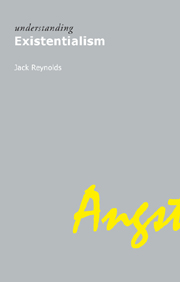Book contents
- Frontmatter
- Contents
- Acknowledgements
- Abbreviations
- 1 Existentialism and its heritage
- 2 Heidegger and the existential analytic
- 3 Condemned to freedom: Sartre's phenomenological ontology
- 4 Sartre: hell is other people
- 5 Merleau-Ponty and the body
- 6 De Beauvoir: feminism and existential ethics
- 7 The legacy of existentialism: deconstruction, responsibility and the time of the decision
- Questions for discussion and revision
- Further reading and references
- Chronology
- Index
5 - Merleau-Ponty and the body
- Frontmatter
- Contents
- Acknowledgements
- Abbreviations
- 1 Existentialism and its heritage
- 2 Heidegger and the existential analytic
- 3 Condemned to freedom: Sartre's phenomenological ontology
- 4 Sartre: hell is other people
- 5 Merleau-Ponty and the body
- 6 De Beauvoir: feminism and existential ethics
- 7 The legacy of existentialism: deconstruction, responsibility and the time of the decision
- Questions for discussion and revision
- Further reading and references
- Chronology
- Index
Summary
Maurice Merleau-Ponty (1908–61) completed his philosophy education at the École Normale Superieure in 1930 (with Sartre and de Beauvoir) and has frequently been associated with existentialism, although he never propounded quite the same extreme accounts of death, freedom, anguished responsibility and conflictual relations with others for which existentialism became both famous and notorious. Instead, he spent much of his academic career contesting and reformulating many of Sartre's positions, including a sustained critique of what he saw as Sartre's dualist and ultimately Cartesian ontology. He also came to disagree with Sartre's rather hard-line Marxism and this was a major factor in what was eventually a rather acrimonious ending to their friendship and editorial collaboration on the influential political, literary and philosophical magazine, Les Temps modernes (for Merleau-Ponty's assessment of their differences see “Sartre and Ultra-Bolshevism” in Adventures of the Dialectic, but for Sartre's version of events see “Merleau-Ponty Vivant” in Situations).
Merleau-Ponty argues that phenomenology is essentially, and necessarily, existential philosophy (PP: xiv), which is to say that any attempted reduction to the “things themselves”, or experience, will actually end up by revealing the way in which experience is always permeated by the existential and social situation of which we are a part. In other words, the attempted phenomenological reduction is necessarily incomplete, but for Merleau-Ponty this inability to complete it actually reveals much about the human situation, and he thought of his project, at least in Phenomenology of Perception (1945), as both continuing Husserl's and also extending it so as to take into account our embodied and historical situatedness.
- Type
- Chapter
- Information
- Understanding Existentialism , pp. 110 - 136Publisher: Acumen PublishingPrint publication year: 2005

